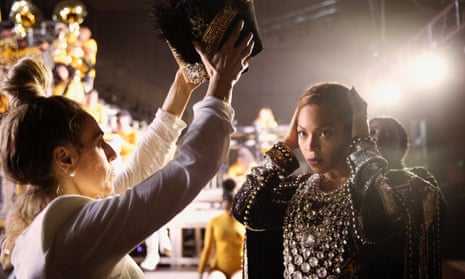As a camera makes its way through a sea of backing dancers, majorettes and marching bands, Beyoncé appears in a sequined robe and headdress reminiscent of Queen Nefertiti. This is the climax of Coachella 2018, and for the next two hours of Netflix’s Homecoming we are ringside for a career-defining performance from pop’s biggest star.
Welcome to the new era of the concert film: big, bold and eminently streamable.
Once the preserve of rock music’s biggest names – such as the Rolling Stones (Gimme Shelter), Pink Floyd (Live from Pompeii) and Led Zeppelin (Song Remains The Same) – concert films have evolved in the streaming era, providing a valued income source for artists and an easy win for the streaming giants.
Meanwhile Studiocanal is releasing Amazing Grace – the concert film of Aretha Franklin’s gospel album of the same name – on 10 May. That follows Taylor Swift’s Reputation, which came out on New Year’s Day, and the December 2018 release of Bruce Springsteen’s Springsteen on Broadway. In January Netflix announced Martin Scorsese would direct a documentary about Bob Dylan’s Rolling Thunder Revue tour, which is due out later this year.
The author and music industry expert Eamonn Forde says the resurgence of interest in concert films has been fuelled – in part – by streaming services’ need for content without the financial burden of drama. “Game of Thrones costs HBO – a reported – $15m per episode,” said Forde. “[With concert films] Netflix are just going to an existing concert. You can get impressive footage for, comparatively, not that much money. If you compare that to a 90-minute episode of original drama, the overheads are really low.”
Forde sees concert films as being similar to standup specials, which Netflix has invested heavily in, not only in that they are cheap to produce but also that they make sense for acts who want to squeeze more cash out of touring, which has notoriously narrow profit margins. “The overheads for a tour are quite high – you don’t really make profit on a tour until the last 10% or 15% of ticket sales,” he said. “So if Netflix comes along and says ‘We’ll give you x amount of money,’ the artists will take it. It’s pure profit.”
As well as traditional concert films, acts are also using Coachella to release more experimental projects. Such is the case with Guava Island by Childish Gambino (aka Donald Glover), a film about a fictional Caribbean country ruled by a despotic factory owner which he co-starred in alongside Rihanna. Featuring a performance of his hit song This Is America, it was released on Amazon Prime last weekend to tie in with his headline slot at the California festival.

For critic and author Hanif Abdurraqib, the fact artists are given creative control over concert films – Beyoncé is named as executive producer and music director on Homecoming – makes them more attractive. “Creative control is a major plus for artists now, who already have so much control over what fans see and don’t see of their everyday lives,” he said. “Social media and the performance of public presentation have all blended into this landscape where an artist can truly write their own narrative for how they wish to appear.”
Forde adds: “It fits with Beyoncé’s approach because her image is so complicated and there’s so much nuance in the way she presents herself, why wouldn’t she want to carry that on in a concert film?
“The concert films need to have visual consistency to continue the aesthetic of Beyoncé.”
Beyoncé’s film is notable because there are moments of intimacy with the star, who has given no interviews since a sit-down with Oprah in 2013. During Homecoming the audience follows her as she discusses trying to recover physically and mentally after having twins in June 2017. It’s the most intimate portrait of her in years – even if every second is delicately stage-managed.
Homecoming has a particular focus on the singer’s love of America’s historically black colleges and universities (HBCU) and in particular their marching bands and musical heritage. “How often do we black women get to perform not just music, but also blackness, in white spaces?” asked author Candice Carty-Williams when writing about Homecoming for the Guardian. “Twenty-two years into her career, Beyoncé gave something new to a world that still defines us by narrow social constraints.”
Music critic Alex Pappademas goes further. “The HBCU symbolises notions of black achievement, excellence, history and solidarity that are antithetical to white supremacy,” he said, adding that in the age of Trump the film has a different dimension. “It’s creative and celebratory first and foremost, but celebrating black culture’s complexity and sophistication and endless invention means something different in this moment than it might have four years ago.”
